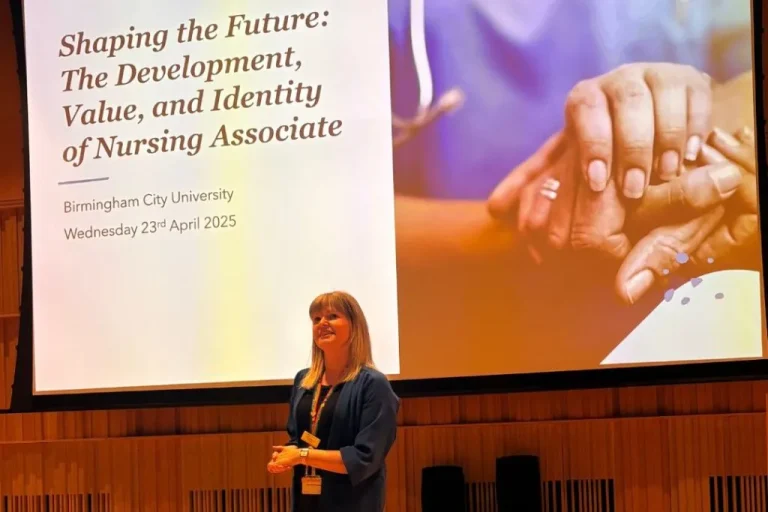Nursing associates are missing out on opportunities to develop their practice, and confusion remains about the role, academics have said.
This week, Birmingham City University (BCU) held a national conference centred around the “development, value and identity of the nursing associate” role.
“A lot of registered nurses still don’t fully understand the role and the importance of the role”
Eve Snape-Tobin
It was the second such nursing associate conference hosted by the university, the first taking place in 2023.
The agenda featured speakers including current and former nursing associates, representatives from the Nursing and Midwifery Council (NMC) and other high-profile figures from nursing.
The event was organised by Erin McKenzie, registered adult nurse and senior lecturer and deputy course lead at BCU’s nursing associate course, alongside fellow adult nurse and nursing associate lecturer Eve Snape-Tobin.
At the conference, held at the Royal Birmingham Conservatoire on Wednesday (23 April), speakers and attendees discussed some of the key challenges facing nursing associates, including role definition and trouble accessing relevant continuing professional development (CPD).
“The theme of the day was the development, value and identity of the nursing associate,” said Ms McKenzie, who explained that this was chosen out of a desire to emphasise that the registered nursing associate is a role in and of itself.
Some attendees, Ms McKenzie said, had remained nursing associates for years, taken on research positions as a registered nursing associate, and one was working in an Agenda for Change band 6 post.
The senior lecturer said the event was successful in reminding some new or in-training nursing associates that they did not have to become a registered nurse in order to progress.
She continued: “There’s often an assumption that you do the nursing associate programme with a view then to becoming a registered nurse… actually we need to identify this role. It is its own role.
“If people become a nurse associate, and after a few years, they [would] like to progress and become a registered nurse, [that is a] brilliant opportunity for those people. But we also need to recognise the role itself.”
However, Ms McKenzie said there were “not a huge amount” of opportunities for nursing associate-specific ongoing training, which presented barriers to progression.
Ms Snape-Tobin added that while many nursing associates enjoy existing in a middle ground between the registered nurse and clinical support worker roles, this meant they were sometimes overlooked.

Eve Snape-Tobin
“Nursing associates, both student and qualified, talk about [how] they sit in a really useful middle place, but [one] that has been missed in CPD terms,” she said.
The event also hosted discussions about the ongoing lack of understanding of what nursing associates are, and what they do, within the broader nursing workforce.
Among attendees were registered nurses and other healthcare professionals who, Ms Snape-Tobin and Ms McKenzie said, were able to learn more about the nursing associate role.
Ms Snape Tobin added: “There was a lot of talk… about the fact that a lot of registered nurses still don’t fully understand the role and the importance of the role, and I thought it was a good space to discuss that, because we had registered nurses there to take that message back to their trusts.
“I think it’s really important that we’re talking about it.”
Sheri Lawrence, a registered nursing associate who spoke on a panel discussion at the event, told attendees that she still had to explain her job role in the workplace, despite having qualified more than two years ago.
Keynote speaker and head of Kingston University’s School of Nursing, Professor Claire Thurgate, said there was still “some confusion” about nursing associates in the workplace, and that more research should be done to help tackle this.

Wendy Fowler speaking at the BCU event
“There’s lots of conversations around how the role is embedded because there are different scopes of practice and this varies from trust to trust,” she said.
“Through the conference we [shared] the impact of nursing associates and experiences of organisation readiness and work and learner identity because many are living the reality.
“We’re aiming to demonstrate the impact of what this role is adding to the workforce and how it is supporting within the health system.”
Wendy Fowler, NMC nursing education adviser, spoke at the conference about the regulation of the role, as well as some of the pressures nursing associates face.
“It’s crucial professionals have the right resources and support in place to deliver the safe and effective care people have the right to receive,” said Ms Fowler, speaking after the event.
“This can include continuous professional development opportunities which are proactively supported by employers, so they can regularly learn and reflect on their practice.
“It’s also important that professionals are able to work within the positive environments they need to thrive and deliver high-quality care for people.”
More on nursing associates

